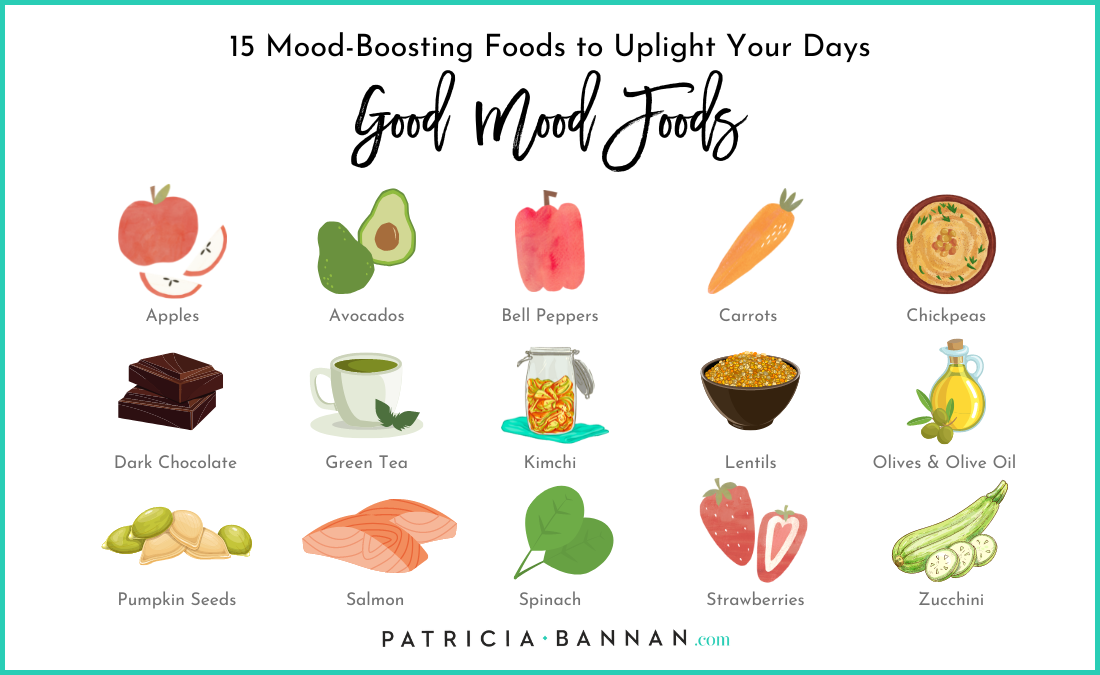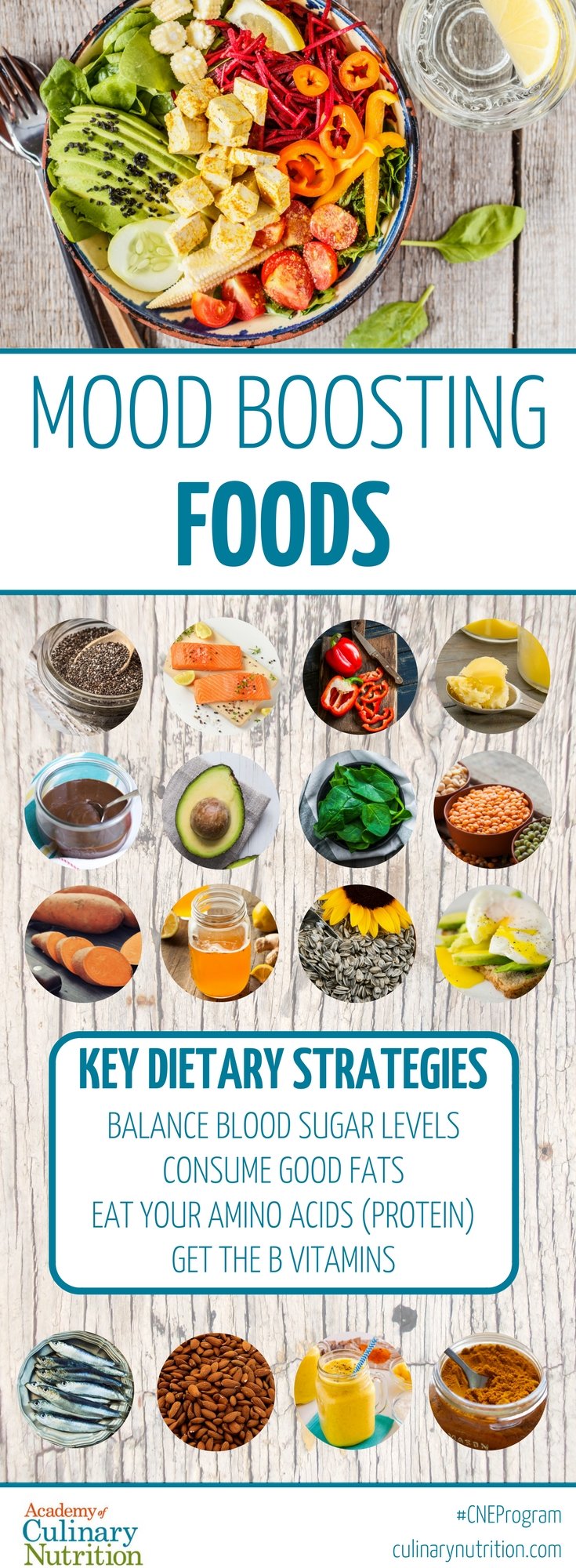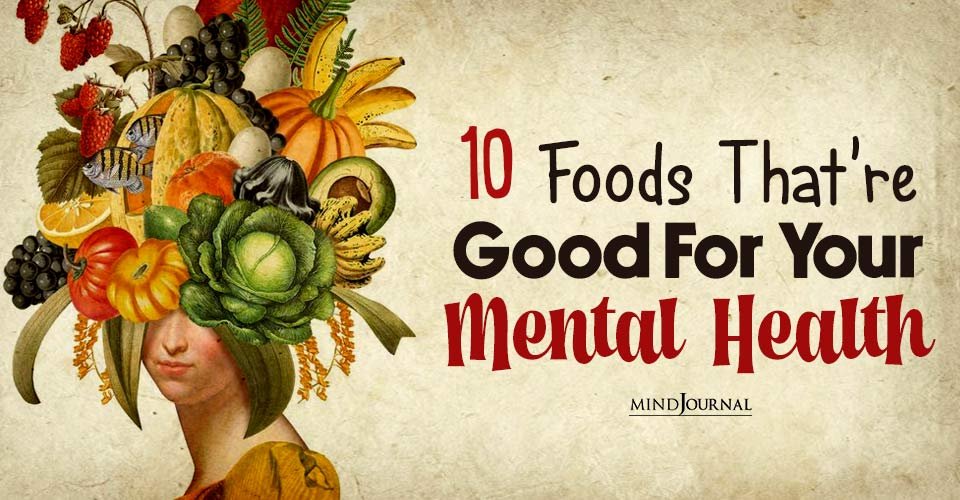Are you looking for a natural and delicious way to boost your mood and improve your mental well-being? Look no further! In this article, we will explore ten incredible foods that have been scientifically proven to enhance your mood. From the rich and creamy taste of dark chocolate to the refreshing goodness of blueberries, these mood-boosting foods are not only delectable but also have incredible benefits for your mental health. So, get ready to tantalize your taste buds and elevate your mood with these incredible foods.

This image is property of www.patriciabannan.com.
1. Dark Chocolate
Cocoa content and mood-boosting properties
When it comes to indulging in something sweet, dark chocolate is a treat that not only satisfies your taste buds but also has numerous mood-boosting properties. The higher the cocoa content, the better it is for your mental well-being. Dark chocolate contains natural compounds such as flavonoids and phenylethylamine that can promote feelings of happiness and improve your mood.
Antioxidants and flavonoids for mental well-being
Dark chocolate is rich in antioxidants, which help protect your brain cells from damage caused by free radicals. These antioxidants, such as polyphenols and flavonoids, have been linked to various mental health benefits. They can reduce inflammation in the brain, improve blood flow, and enhance cognitive function. So, the next time you’re feeling low, reach for a small square of dark chocolate and let it lift your spirits.
Serving size and moderation
While dark chocolate can provide some mental health benefits, it’s important to enjoy it in moderation. Consuming excessive amounts may lead to weight gain and other health issues. Stick to a small portion, around an ounce or two per day, to reap the mood-boosting benefits without going overboard. Remember, quality over quantity is key when it comes to dark chocolate and your mental well-being.
2. Berries
Nutritional benefits of berries
Berries are not only delicious but also packed with essential vitamins, minerals, and fiber that can support your mental well-being. These vibrant fruits, such as blueberries, strawberries, and raspberries, are loaded with antioxidants and nutrients that can help combat oxidative stress and reduce inflammation in the brain.
Anthocyanins and brain health
One specific group of antioxidants found in berries, called anthocyanins, has been strongly associated with brain health. Anthocyanins have been shown to promote the growth of new neurons, enhance memory, and improve overall cognitive function. So, adding a handful of fresh or frozen berries to your diet is a delicious and easy way to give your brain a boost.
Incorporating berries into your diet
Berries are incredibly versatile and can be incorporated into your daily meals in various ways. You can enjoy them as a topping for your morning oatmeal or yogurt, blend them into a smoothie, or simply snack on them as a midday treat. Additionally, freezing fresh berries allows you to have them year-round and adds a refreshing twist to your beverages or desserts.

This image is property of www.culinarynutrition.com.
3. Fatty Fish
Omega-3 fatty acids and brain function
Fatty fish, such as salmon, trout, and sardines, are excellent sources of omega-3 fatty acids, which are essential for optimal brain function. Omega-3 fatty acids play a crucial role in maintaining the structure and integrity of brain cells, as well as regulating neurotransmitter levels. A deficiency in omega-3 fatty acids has been linked to an increased risk of mental health disorders such as depression and anxiety.
Benefits of fatty fish for mental health
Consuming fatty fish regularly has been associated with numerous mental health benefits. Studies suggest that omega-3 fatty acids can help reduce symptoms of depression, improve cognitive performance, and enhance overall mood. Including fatty fish in your diet can have a positive impact on your mental well-being and contribute to a healthier brain.
Choosing and preparing fatty fish
When selecting fatty fish, opt for wild-caught varieties as they tend to have higher omega-3 fatty acid content compared to farmed fish. You can enjoy fatty fish grilled, baked, or even as part of a nourishing fish stew. Pair it with a side of leafy greens or whole grains for a complete and wholesome meal that promotes both physical and mental well-being.
4. Nuts and Seeds
Healthy fats and mood regulation
Nuts and seeds are nature’s little powerhouses packed with healthy fats that are essential for mood regulation and maintaining brain function. They are rich in omega-3 fatty acids, which have been shown to reduce inflammation in the brain and support cognitive health. Including a variety of nuts and seeds in your diet can provide a significant boost to your mental well-being.
Nutritional profile of nuts and seeds
Different nuts and seeds offer various nutritional benefits. For example, walnuts are an excellent source of alpha-linolenic acid (ALA), a type of omega-3 fatty acid. Almonds are rich in vitamin E, which acts as an antioxidant and protects brain cells. Chia seeds are packed with fiber, omega-3 fatty acids, and magnesium – all important nutrients for brain health. Including a handful of nuts and seeds in your daily routine is a simple and enjoyable way to support your mental well-being.
Different ways to enjoy nuts and seeds
Nuts and seeds can be enjoyed in a variety of ways. You can snack on them raw, roasted, or even try different flavored varieties. Sprinkle them on top of salads or stir them into your morning oatmeal or yogurt. Nut butters, such as almond or peanut butter, can also be added to smoothies or used as a spread on whole grain bread. Be creative and experiment with different combinations to find your favorite way to incorporate nuts and seeds into your diet.

This image is property of files.selecthealth.cloud.
5. Leafy Greens
Nutrient-rich leafy greens for mental well-being
Leafy greens, such as spinach, kale, and Swiss chard, are nutritional powerhouses packed with essential vitamins and minerals that promote mental well-being. These greens are high in folate, a B-vitamin that plays a crucial role in neurotransmitter synthesis and mood regulation. Including leafy greens in your diet can provide a significant boost to your mental health.
Folate and vitamin B12
Folate, along with vitamin B12, is essential for the production of serotonin and dopamine, neurotransmitters that play a key role in regulating mood and emotions. Low levels of folate have been linked to an increased risk of depression and other mental health disorders. By incorporating leafy greens into your meals, you can ensure you’re getting an adequate amount of folate and other essential nutrients that support your mental well-being.
Incorporating leafy greens into meals
Adding leafy greens to your meals doesn’t have to be boring. You can sauté them with garlic and olive oil as a side dish, blend them into smoothies, or include them in salads. Another creative way to enjoy leafy greens is by using them as a base for wraps or sandwiches instead of traditional bread. The possibilities are endless, and by incorporating leafy greens into your meals, you’re not only nourishing your body but also supporting your mental health.
6. Yogurt
Probiotics and gut-brain connection
Yogurt is a versatile and delicious food that can contribute to your mental well-being through its impact on the gut-brain connection. Yogurt contains probiotics, which are beneficial bacteria that promote a healthy gut microbiome. Emerging research suggests that the gut microbiome plays a crucial role in regulating mood and mental health.
Calcium and protein for overall mental health
Apart from probiotics, yogurt is also a great source of calcium and protein – two nutrients that are essential for overall mental health. Calcium has been linked to a reduction in symptoms of anxiety and depression, while protein provides the building blocks for neurotransmitter production. By choosing the right yogurt, you can enjoy the benefits of probiotics, calcium, and protein for a healthy mind.
Choosing the right yogurt
When choosing yogurt, opt for varieties that contain live and active cultures to ensure you’re getting the probiotic benefits. Avoid yogurts that are high in added sugars, as excess sugar consumption has been linked to adverse effects on mental health. Additionally, consider opting for Greek yogurt, which has a higher protein content compared to regular yogurt. Enjoy yogurt as a snack, add it to smoothies, or use it as a base for dressings and sauces to incorporate this mental health-friendly food into your diet.

This image is property of themindsjournal.com.
7. Eggs
Choline and brain function
Eggs are not only versatile but also packed with essential nutrients that support brain health. One such nutrient is choline, which is found in egg yolks. Choline is essential for the production of acetylcholine, a neurotransmitter important for memory and cognitive function. Including eggs in your diet can provide a significant boost to your brain health.
Vitamin D and mood regulation
Eggs are also a natural source of vitamin D, a nutrient that plays a crucial role in mood regulation. Vitamin D deficiency has been linked to an increased risk of depression and seasonal affective disorder (SAD). By incorporating eggs into your diet, you can ensure you’re getting an adequate amount of vitamin D to support your mental well-being.
Healthy ways to cook eggs
When it comes to cooking eggs, there are several healthy methods to choose from. Boiling or poaching eggs can retain most of their nutrients without adding excessive fats or oils. If you prefer scrambled eggs, opt for using olive oil or a small amount of butter for cooking. Avoid heavy use of salt or processed ingredients and experiment with incorporating vegetables or herbs to add flavor and nutrients to your egg dishes.
8. Turmeric
Curcumin and its positive impact on mental health
Turmeric, a yellow spice commonly used in curry dishes, contains a compound called curcumin that has shown positive impacts on mental health. Curcumin has potent antioxidant and anti-inflammatory properties, which can protect brain cells from damage and reduce inflammation in the brain. These effects can contribute to improved mental well-being and even potentially help in managing symptoms of depression and anxiety.
Anti-inflammatory properties and brain health
Chronic inflammation in the brain has been linked to the development of mental health disorders. By incorporating turmeric into your diet, you can harness its anti-inflammatory properties and potentially reduce the risk of such disorders. However, it’s worth noting that curcumin absorption is enhanced when consumed with black pepper or healthy fats, such as olive oil or coconut milk.
Ideas to incorporate turmeric
To reap the mental health benefits of turmeric, consider adding it to your cooking. You can use it in curry dishes, stir-fries, or even sprinkle it on roasted vegetables. Golden milk, a warm beverage made with turmeric, milk, and spices, is another popular way to enjoy the benefits of this spice. Get creative in the kitchen and explore different recipes to incorporate turmeric into your meals and support your mental well-being.

This image is property of queenspressndala.org.
9. Bananas
Vitamins and minerals for stress reduction
Bananas are a convenient and delicious fruit that can help reduce stress and promote mental well-being. They are packed with essential vitamins and minerals, including vitamin B6, vitamin C, and potassium. These nutrients play a crucial role in adrenal function and the production of stress hormones, helping your body manage stress more effectively.
Tryptophan and serotonin production
Bananas also contain tryptophan, an amino acid that the body converts into serotonin, a neurotransmitter involved in mood regulation. Consuming foods rich in tryptophan, such as bananas, may support the production of serotonin and promote feelings of relaxation and happiness.
Creative ways to enjoy bananas
There are countless ways to enjoy bananas beyond just peeling and eating them as is. You can slice them and add them to your morning cereal or oatmeal for a natural sweetener. Freeze them and blend them into creamy banana ice cream or smoothies. Baking with mashed bananas can also add natural sweetness and moisture to your baked goods. Let your creativity flow and experiment with different ways to incorporate this versatile fruit into your diet.
10. Whole Grains
Complex carbohydrates and mood stabilization
Whole grains, such as brown rice, quinoa, and whole wheat, provide a steady source of complex carbohydrates that support mood stabilization. Complex carbohydrates provide a slow release of glucose into the bloodstream, providing sustained energy and preventing the rapid spikes and crashes associated with refined carbohydrates. Stable blood sugar levels contribute to a more stable mood and overall mental well-being.
Fiber and gut health
In addition to complex carbohydrates, whole grains are also high in dietary fiber, which plays a crucial role in maintaining a healthy gut. Emerging research suggests that there is a strong connection between gut health and mental health. Consuming fiber-rich whole grains can support a diverse gut microbiome and potentially improve symptoms of anxiety and depression.
Examples of whole grain foods
Incorporating whole grains into your meals is easier than you may think. Choose whole grain varieties of bread, pasta, and rice. Explore different ancient grains like quinoa, amaranth, and farro for added variety and nutrition. Replace refined grain products with their whole grain counterparts whenever possible and experiment with different recipes to discover new and exciting ways to enjoy the mental health benefits of whole grains.
Incorporating these mood-boosting foods into your diet can be a simple and enjoyable way to support your mental well-being. From indulging in a square of dark chocolate to savoring a delicious salmon dish, each of these foods has unique properties that can contribute to a healthier brain and a happier you. Remember, balance and moderation are key, so aim to include a variety of these foods in your meals while still enjoying a well-rounded diet. Take care of your mental well-being by nourishing yourself with these delicious and nutritious options.